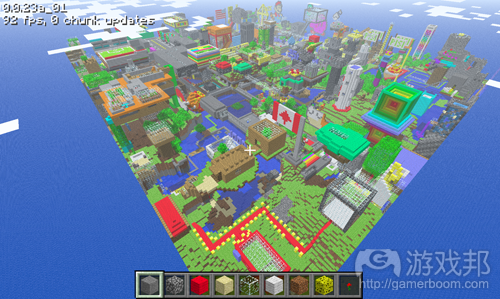盘点真正出色的游戏必须具备的特征
作者:Aaron San Filippo
不久前我刚提出一个观点,即创造一款优秀的游戏是游戏开发者的首要任务。
我同样说到在缺乏市场营销成本的前提下:
*平庸的游戏经常会失败,
*好游戏时常会失败,
*而出色的游戏则很少会失败。
这些想法引起的争议超过我的预期。人们对此有两种常见的反应,一种便是:“谁来决定杰出的标准?难道不是各花入各眼,情人眼里出西施吗?”
所以我认为有必要通过这篇文章明确创造一款“杰出”游戏到底意味着什么,并列举一些实际的应用准则作为我们日常开发的参照。
另外一种常见的反应则是:“平庸的游戏却总是能够赚取上百万元收益!”
如此便引出了一个开放性思维问题:为什么我们可以毫无争议地为游戏贴上“平庸”的标签,但对于杰出游戏的定义却需要涉及抽象的哲学领域?
如果我们能够客观地判断一款游戏是糟糕的,那么我们是否也能够客观地判定一款游戏是杰出的?在我们追求杰出游戏的过程中是否存在哪些具体的目标和标准?还是说我们只需要高举双手并高喊着“尽你所能并热爱你所做的事!”然后期盼着别人能够喜欢我们所创造的作品?
在深入分析之前我想先明确一个事实,即我所说的一切都是将游戏当成一种商业。我已经辞去了自己的日常工作,希望全身心投入自己所热爱的事业并以此谋生。
我对于学术意义上关于“杰出”的定义非常感兴趣,但是我也想搞清楚在实际的商业角度中:玩家会认为怎样的游戏才是真正有价值的游戏?我之所以会说创造杰出游戏是开发者的首要任务是因为只有这类游戏才能赋予多数业务更多意义,并让它更加令人满意。
接下来让我们详细地进行说明。
什么游戏才称得上杰出?
从游戏角度来看,我认为“杰出”其实是游戏和玩家之间的一种交易。
换句话说,游戏的存在便是让玩家进行体验,所以只有玩家在游戏过程中能够感受到它的出众之处时它才算是真正的成功。也许有人不同意这种说法,但是也许这种基本的定义能让我们稍微摆脱哲学领域而回到实际的工作讨论中。
Stephen Totilo(游戏邦注:电子游戏博客Kotaku主编)最近声称“杰出游戏”与“糟糕游戏”的不同之处便在于前者拥有有趣的选择(游戏邦注:这也是《文明》之父Sid Meier被反复引用的观点)。之后他又补充道一款出色的游戏还拥有“Merihari”——这是一个日语单词,译为节奏,平衡和分布的结合。
但是很快便有人指出像《吉他英雄》等游戏便没有多少选择,但是却仍然具有非常大的吸引力。
所以我认为即使Stephen的想法有一定道理,但却过于片面了。“有意义的选择”虽然是高价值游戏的特征,但却不是基本特征,当然也不是游戏中唯一重要的特征。
而让我感到好奇的是,出色的游戏是否根本就不存在任何基本特征。
是否所有杰出的游戏都需要具有有趣的选择?并不是这样的,就像我们前面所指出的,像《吉他英雄》等大受欢迎的游戏便没有多少选择。《节奏奔跑者》亦是如此。
那易用性呢?也不是:《Minecraft》便不是那么容易上手的游戏,但是玩家却都认为这是一款非常出色的游戏。
华丽的图像?当然不是。
挑战性?我想也不是,尽管这是一个非常强大的特征。
对于任何特征,总是会跳出一些人来指出某某游戏不具备这一特征,但是也仍有许多人认为它便是造就一款出色游戏的主要特征。所以到底高价值且出色的游戏具有何种共同点呢?
无一例外,这些游戏总是能够突出自己真正擅长的一些内容。并且我们能够很容易辨别出这些高质量的游戏特征,它们具有惊人的相似处。
例如比起其它游戏,《Minecraft》便非常擅于提供给玩家各种选择和探索。它为玩家们提供了一个可以无限修改的无限世界。
而《半条命》则在调整节奏,优化挑战,创造技术能力,讲故事等方面做得很好。有些人可能会说“整体大于各部分总和”,但正是这些“出色”特征才造就了这款优秀游戏。
关键在于没有人会认为一款未突出任何特征的游戏是出色的。如果一款游戏真的突出了某些特征,那便能够有效地弥补它的其余次要特征,确保这些表现不足的元素不会过度影响玩家的游戏体验。
所以我的要点到底是什么?
第一:
选择那些你的游戏真正擅长的元素。不要只满足于做到非常好,而是应该力图凸显于同类游戏中。但要量力而行,不要让团队在自己其实并不擅长的领域上盲目逞强,但也不要自我贬低,认为团队在任何一个领域都没有出色表现。
第二:
思考其它有价值的高质量特征,并挑选一些特征作为次要目标——或者以此去衡量游戏的执行效果。
也许你将因此发现一个你从未考虑过的重要领域,或者你将可能察觉到一个自己非常擅长的特征。这时候你便需要问自己如何去发展这些特征,并以此推动你的游戏变得更有价值。
第三:
千万不要带着别人将会喜欢自己的游戏这种盲目想法去制作游戏。你既需要清楚自己喜欢玩什么并以此展开创作,同时也需要了解别人希望从你的游戏中体验到什么。围绕着这两点开发者便有可能取得成功——但是其中一点较为直观且容易实现,而另一点不仅非常复杂,代价昂贵,并且难以实现。
杰出游戏的共同特征
以下我将列出我们作为玩家和开发者在游戏中所挖掘到的一些特征(排序不分先后)。切忌将其统统放进你的游戏中,你需要将其当成一列潜在的特征列表,并基于自己的追求去判断它们的可用性。
有些特征能帮助你的游戏吸引更广泛的用户;有些特征能帮助你吸引细分市场的用户;有些特征能帮助你更好地吸引媒体关注;有些特征能帮助你更轻松地实现盈利;而有些特征则能帮助你更好地占领手机平台。
这里也交叉存在着一些艺术和商业元素!
1.易用性—-无需额外指示便能够让玩家轻松地玩游戏。
2.技术成就—-游戏能让玩家感叹道:“他们是怎么做到的?!”
3.美学共鸣—-你的游戏能否让玩家想起它们的童年时光或日常生活?或者只是创造出了一些一开始对玩家没有任何意义的抽象元素?
4.游戏玩法共鸣—-玩家是否能够认出你的游戏机制和目标?(例如《愤怒的小鸟》的弹弓和《Trucks & Skulls》的斜坡机制哪个更能引起你的共鸣?)
5.节奏—-你是否合理地表现出了游戏元素?游戏中是否总是会出现一些新内容?
6.强度管理—-你的游戏是否存在高峰和低谷,你的管理方法是否有效?
7.乐趣—-无可否认的是这一点非常重要。但是当你在玩自己的游戏时是否真正感受到了乐趣?
8.社交性—-例如,你的游戏是否具有聊天室或者关卡分享功能?
9.竞争—-你的游戏是否能够通过玩家间的竞争而衡量他们的技能?
10.令人上瘾—-这点也很主观,但也是一种很好的测量方法。玩家平均会花多少时间玩游戏,又是多长时间回到游戏中?
11.视觉吸引力—-你是否喜欢游戏的外观?还是你总是以“至少游戏拥有有趣的游戏玩法”自我安慰?
12.幽默感
13.最佳挑战—-玩家是否能够轻松地完成游戏?你是否会因为游戏过于简单而很容易感到厌烦?
14.挫败。这是我在尝试了《Spelunky》(游戏邦注:一款动作游戏)后添加的一个元素。我认为游戏可以通过难度去影响玩家,并将此当成一种有益的特征——假如这些机制是一致的且具有学习意义的话。
15.独特性—-如果从PR和第一眼吸引力来说这一点非常重要。你的游戏是否能够提供给玩家他们从未感受到的体验?
16.多样的视觉效果
17.多样的玩家行动
18.可表现性—-游戏是否能让玩家以某种方式去表现自己?
19.具有创造性的游戏玩法—-游戏是否允许玩家使用各种方法去解决游戏中的问题?
20.长寿—-一个玩家愿意在你的游戏中花费多少时间(而不感到无聊)?
21.简单—-例如玩家是否能够单指玩游戏(如果是手机游戏的话)?
22.精通—-如果玩家拥有足够的技能是否就能“精通”游戏并比新手做得更好?
23.“讲故事”
24.随机性—-使用合理的话这便是一大优势,并且将影响游戏的寿命,挑战等元素。
25.突现—-游戏元素是否是以出乎意料或不可预见的方式而出现?
26.公平性—-你的游戏是否曾经让那些表现得很好的玩家遭遇失败?(这便会引起玩家“糟糕的”挫败感。)
27.“紧凑性”
28.情感—-你的游戏中是否存在哪些角色或元素能够诱发玩家的情感?
29.有趣的选择—-玩家是否能在游戏中做出选择,并且“正确的”选择也总是有所不同?
30.使用节奏
31.使用条件反射
32.使用谜题解决方法—-玩家是否需要在游戏中思考如何解决问题?
33.使用记忆能力
34.“优化”—-这一元素较为模糊,但丰富的开发经验有助于实现这一点。
35.请你补充……
我希望本文有助于你们更加客观地看待自己的游戏。当然了,与美丽一样,“杰出”也适用于“情人眼里出西施”这一道理,它没有明确的定义。
但是如果我们真心想要创造一款值得人们谈论,值得人们购买,值得人们牢记并坚守于游戏中长达10年的游戏,我们便需要明确自己的游戏真正突出的高质量特征。(本文为游戏邦/gamerboom.com编译,拒绝任何不保留版权的转载,如需转载请联系:游戏邦)
Opinion: Pursuing excellence
by Aaron San Filippo
Awhile back, I argued that making an excellent game should be a game developer’s #1 priority.
I also suggested that in the absence of marketing dollars:
mediocre games usually fail,
good games often fail,
and excellent games rarely fail.
These ideas were a little more controversial than I expected. There were two common responses. One of them was: “Who gets to decide what’s excellent? Isn’t beauty in the eye of the beholder?”
So I thought I’d write a followup post to explore what it means make an “excellent game,” and hopefully arrive at some practical applications that will help us in our everyday development.
The other of the two common responses was: “But mediocre games make millions all the time!”
So here’s an opening thought question: why is it that we have no qualms about labeling a game “mediocre,” but the concept of excellence is relegated to the realm of philosophy?
If a game can be objectively bad, can a game also be objectively excellent? Are there no concrete goals and standards we can make for ourselves in pursuit of excellence – or do we really just throw our hands up in the air and say “Just do your best and love what you do!” and then hope other people enjoy what we make?
Before I go any further (and lose anyone who was hoping for a practical discussion here,) let me be clear that pretty much everything I say is through the lens of games as a business. Forest and I have quit our day jobs in hopes of making a living by doing what we love.
So, I’m interested in “excellence” in terms of academic thought – but also in practical business terms: what makes a game highly valuable to a paying audience? When I argued that pursuing excellence should be priority #1, it’s because I think this is what makes the most business sense – and is incidentally more fulfilling.
Maybe we just need to be more specific.
So what is an Excellent game?
In terms of games, I would suggest that Excellence is a transaction that happens between a game and the player.
To put it another way, a game is – by definition – meant to be played, and a game proves itself to be excellent when an audience finds it to be so through play. You may disagree, but perhaps that baseline definition can get us out of the realm of philosophy a bit, and back towards practical working discussion.
Stephen Totilo recently argued (repeating a definition coined by Sid Meier) that what sets apart “good games” from “bad games” is that the good ones have interesting choices. He added after talking with Dylan Cuthbert and others that good games also have “Merihari,” – a Japanese word that’s roughly translated as a combination of rhythm, balance, and distribution.
However, others are quick to point out that games such as Guitar Hero involve little meaningful choice, and would probably be appealing even without the little choice that is there.
I think Stephen is onto something here, but perhaps his definition is too narrow. “Meaningful choice” is a trait that we have come to value highly – but it’s not an essential trait, and it’s certainly not the only trait that matters.
The curious thing to me, is that perhaps there are no essential traits for games that are considered excellent.
Do all excellent games need to have interesting choice? No – as pointed out already, games such as Guitar Hero are highly engaging without it. Bit.Trip Runner is another great example.
Accessibility, perhaps? No: Minecraft is certainly not accessible, and people surely consider it to be excellent.
Great Graphics (whatever that means)? Certainly not.
Challenge? I don’t think so, although this is a very powerful trait.
For any given trait, someone could point out a game that doesn’t have that trait, but that’s considered excellent by many people. So what do excellent, highly valued games all have in common?
Well, without exception, they always find something to be really good at. And usually, these quality traits are both easy to identify, and surprisingly common.
For example, Minecraft is really good at player choice and exploration – better than most other games. It provides an infinite world that’s infinitely modifiable.
Half-Life is arguably very good at pacing, optimal challenge, technical competence, storytelling, and a lot of other things – some objective, some subjective. Some would say it’s “more than the sum of its parts,” and that all these “great” traits add up to excellence.
The point is – nobody ever considers a game excellent if it excels at nothing. And if a game really excels at something, this can often (as is the case with Minecraft) make up for a multitude of sub-par traits, provided these lacking elements don’t get in the way of the player’s experience too much.
So what’s my point with all of this? This is, after all, meant to be a practical article.
First:
Pick something your game is going to do really well. Don’t settle for “pretty good” in this area, shoot for best in class. Don’t try to be best in class at something that your team can’t pull off – but don’t be fooled into thinking that you can’t be best in class at anything.
Second:
Think about some of the other quality traits that you and others value in games, and perhaps pick some of these as secondary goals – or at least measure your game’s execution on these traits as a helpful experiment.
Maybe you’ll identify an area that’s seriously lacking that you hadn’t really considered, or perhaps you’ll identify a trait that it’s actually pretty darn good at. Ask yourself what would take this particular trait to the next level and make your game worth talking about!
Third:
For Pete’s sake, don’t make a game that you hope others are going to like. You’ve got to either know exactly what you like to play and make that, or you’ve got to be an expert at knowing what others want through years of experience and research. Developers have been successful with both methods, but one of them is intuitive and fulfilling, the other is difficult, expensive, and often unfulfilling.
Common traits of excellence
To wrap things up – here are a few traits that I think we as players and developers have come to recognize and value in games, in no particular order. Don’t read this as a list of things to put in your game – read it as a list of potential traits that may or may not be good goals for you to pursue.
Some of these traits will make your game appealing to wider audiences. Some will make it more appealing to specific niche audiences. Some will make your game more interesting to talk about to journalists, and some will make it easier to monetize. Some will be more helpful on mobile platforms – others would feel really out of place there.
Make no mistake: there is an an intersection of art and business here!
1.Accessibility – the ability for a player to play your game without much instruction or confusion.
2.Technical achievement – can your game make people ask: “how did they do that?”
3.Resonance in aesthetics – Can your game relate to your audience in a way that brings back memories of their childhood or their everyday life? Or is it made up of abstract elements that mean nothing to them at the outset?
4.Resonance in gameplay – Do the mechanics and objects of your game behave in a way that people will recognize? (For instance, compare Angry Birds’ slingshot to that of the ramp mechanism in Trucks & Skulls. Which resonates better with you?)
5.Pacing – are the elements of your game introduced properly? Is there always something new happening?
6.Intensity management – does your game have highs and lows, managed in ways that have proven to be effective?
7.Fun – A big topic, admittedly. But when you play your game, are you “having fun” with it?
8.Social connectedness – For instance, does your game have a chatroom, or level sharing features?
9.Competitiveness – does your game measure the player’s skill against other players?
10.Addictiveness – again very subjective – but also measurable. How long to people play it on average, and how often do they come back?
11.Visual appeal – do you like the way it looks? Or do you find yourself thinking “well, at least it has good gameplay…”
12.Humor
13.Optimal challenge – are people completing it? Do you get bored while you play because it’s too easy?
14.Frustration. I added this after playing Spelunky. I think games can taunt a player with their difficulty, and turn this into a desirable trait, provided the mechanics are consistent and learnable.
15.Uniqueness – This can be big in terms of PR and immediate appeal. Does your game give people an experience they’ve never had before?
16.Variety of visuals
17.Variety of player actions
18.Expressiveness – does the game allow the player to express herself in some way?
19.Creative Gameplay – does the game allow a variety of solutions to the problems it presents?
20.Longevity – how much time can one reasonably spend in your game without getting bored?
21.Simplicity – for example: can it be played with one thumb if it’s a mobile game?
22.Mastery – can one “master” your game if she is skilled enough and do measurably better than a beginner?
23.”Storytelling”
24.Randomness – this can be a strength if used properly, and can affect longevity, challenge, etc.
25.Emergence – do the elements of your game combine in unexpected or unpredictable ways?
26.Fairness – does your game ever make the player fail despite the player’s perfect execution? (this usually results in a “bad” type of frustration.)
27.”Tightness” – see Daniel Cook’s article on the subject.
28.Emotion – does your game have characters or elements that humans will relate to in an emotional way?
29.Interesting choices – is the player asked to make decisions, where the “right” choice isn’t always the same one?
30.Use of Rhythm
31.Use of Reflexes
32.Use of puzzle-solving – is the player asked to think about how to solve a problem?
33.Use of Memorization
34.”Polish” – this is a fuzzy one. Experience helps.
35.<enter your own here!>
I hope this was helpful. The goal is to help us look at our games through more objective lenses. Of course, “Excellence,” like beauty, is ultimately in the eye of the beholder and will defy explicit definition.
But I think it’s critical to our success that if we want to make games that are worth talking about, worth buying, and worth remembering and playing 10 years from now, we need to identify the quality traits that each of our games will excel at.
So – what is your game excellent at?(source:GAMASUTRA)









































 闽公网安备35020302001549号
闽公网安备35020302001549号